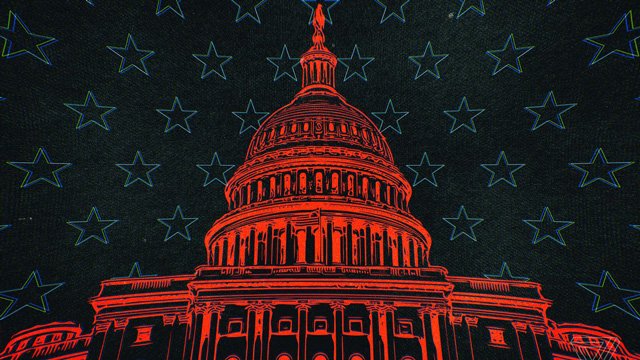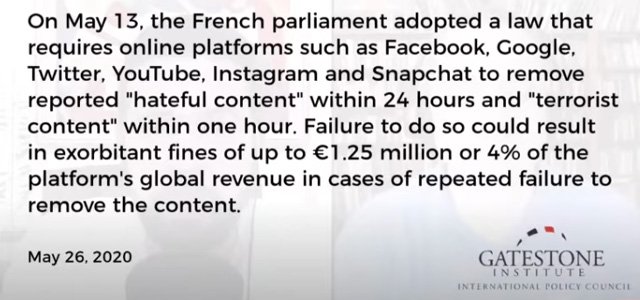Censorship sucks. That's pretty obvious. If you haven't been on the receiving end of it, you probably know of someone who's felt it. Pick a popular social media platform and there are hundreds if not thousands of people who have been censored on each.

Source
It's been ramping up the past 2-3 years. People have called for government to be the big brother and regulate (control) these big tech giants. And Trump has initiated steps to do that. Last week he signed an Executive Order to reevaluate Section 230 of the FTC. The argument is they act as editors, so they should be exempt for the 'liability shield' provided by Section 230.
"Currently social media platforms like twitter enjoy a liability shield because they are a 'neutral platform' - which they are not...social media companies who engage in editing or censorship will be stripped of this shield, while companies will be punished should they engage in any "deceptive" acts. Federal agencies will also be barred from buying advertising on these platforms - a direct attack on their bottom line."
A review is on the way. The goal is to remove their immunity for liability, to make them liable. What does that mean?
Currently, these social media giants can't be sued for published content, unlike mainstream media can. But when they act as editors of the content, the Section 230 shouldn't apply anymore, so the argument goes.
What will that result in? More censorship. What, what do you mean more?
Think about it. When the social media giants no longer have the liability for content published on their site, they are going to have to become real editors of all the content. Lawsuits will come rushing in if they don't, and they will go bankrupt in a bit of time. Mass sell off will help that happen. But they might survive.
Some users will get booted, eyeballs will decrease, ad revenue as well, but most of the fluff content will remain and people will still go there to do whatever crap they do. The informational content is not their biggest source of viewership or interaction. I don't think it will affect them much. But those of us who use the site for disseminating information will be greatly affected.
It's better to censor that get fines by governments or face lawsuits from people suing. France has already put in a law in May 13 to fine Facebook, YouTube, Twitter, Instagram and Snapchat 1.25 million euros if they don't remove certain content within 1 day or 1 hour.

In essence, what Trump is doing is going to ensure that more censorship happens. It's a Hegelian dialectic. Thesis, antithesis and synthesis. Two seemingly opposing sides that will "battle" to form a new model that produces the outcomes both want: control of the information.
The current goal of censorship on the various social media platforms is for the control of information. This controls and limits the perceptibility of information, which control what people can see and come to think about. It's mind control.
More government influence and control will not give us less censorship and mind control. The revision of Section 230 to exclude social media will apply not only to the tech giants, but to all the other social media sites. Ya, those sites that the those who spread their informational content use as alternatives.
Site like bitchute, 3speak, lbry, and whatever else, are alternatives that should replace the mainstream social media giants. We want social media to collapse so that these alternatives can grow. Instead, Trump is helping to secure dominance of social media giants as only they will be able to survive the government regulation.
If people want to regulate social media if they regulate free speech, they are not going to get their free speech in the end. Not if they target Section 230 to make them liable as publishers and editors. Expect more control over free speech and information flow.
Want to challenge the mainstream narrative of current events? Denied.
Want to challenge the history books? Denied.
Want to talk about conspiracy theories? Denied.
Whatever side you look at, they want control. Social media and government want to control information. This fight against censorship being in the hands of government, is not a winning battle for those of us who want to preserve free speech.
Maybe you think this is far fetched. Maybe you think the government doesn't try to limit access to information. Maybe you think the government isn't threatened by information. Hmm, maybe you've heard of WikiLeaks.
Governments around the world don't want people to know about certain information. Social media sites are a marketplace for the exchange of written or verbal speech and information. WikiLeaks has broken open so many previously unknown facets of government dealings. The most important are arguable those from Edward Snowden and Chelsea Manning.
In 2009, WikiLeaks put out an editorial about growing pro-government censorship titled Western internet censorship: The beginning of the end or the end of the beginning?.
The biggest censoring government is China. They are a model for authoritarians (governments) the world over. They have had WikiLeaks banned since 2007. In 2009, other governments like Australia where Julian Assange is from, put WikiLeaks "onto a secret list of sites "forbidden" by the Australian Media and Communications Authority, or ACMA."
WikiLeaks offices were even raided by German police in March 2009. Some information is that damaging to the authoritarian architecture of our societies.
Other pro-censorship governments fall into 3 categories according to WikiLeaks:
The pro-censorship governments exposed by Wikileaks can be divided into three broad categories:
- Countries with a mandatory censorship system in place: Thailand, the UAE, and Lebanon (films).
- Countries proposing a mandatory censorship system: Australia and Germany.
- Countries in which the internet censorship system is an unregulated agreement between several large ISPs and the police: Norway, Denmark and Finland.
These measures are originally adopted through justifications of stopping criminal activity, like child pornography. But those are stepping stones to greater online censorship. It eventually leads to political content.
That's basically what has happened to social media. First it was violence or criminal activity that was banned, and now it's inconvenient political views.
Governments want a lot of information censored. If the legal structure wasn't so well established for freedom of speech, they would just censor things left and right. And some governments have because they just trample on thees rights with new "laws". They have "magical" powers and rights the rest of us don't.
Weakening the established free speech measures will serve to aid in those efforts to increase censorship. This is what "repealing Section 230" will lead do. It may be a slow grind to chip away at, so as to make it less perceptible, but Trump is on the job with a chisel.
References:
Technically, this is incorrect. Under the current practices, they are idemnified from liability, which they should not be because they are editing content, censoring users, and shaping narratives. Publishers are liable for what they publish, but the tech platforms have assumed the ability to choose what is published on their platforms without being liable for it, and that's what is being reviewed and proposed to eliminate.
It is making them liable for what is published that is being done.
What is being removed is their indemnity from liability that is afforded to common carriers, such as phone companies that do not edit, censor, or shape narratives.
The tech platforms, should the US simply actually hold them liable for what is published if they edit, censor, and shape narratives, theoretically could remain indemnified from liability if they stop that crap.
The EU isn't giving them that option, and they are far too invested in narrative control IMHO to give it up just retain their practical indemnification in the US market.
Overall, you're spot on in how this will advance censorship, just confusing liability with indemnity from liability.
Thanks!
Oh snap, thanks for that. I've corrected it ;) Remove their immunity from liability, to make them liable, is what I changed it to.
And yeah, it could make them no longer edit and censor things but I think that ship has sailed lol, as you point to.
I'm glad you chose this topic, because it's a very important one! Many people are going to believe that the regulation of these platforms will lead to less censorship, when that is not going to be the case. The road is being paved for more censorship, and this regulation will only help the giant social media platforms entrench themselves as monopolistic and controlling entities!
Thanks ;) Yeah, it's easy to buy into it. They either comply and censor more, or reverse course which is doubtful.
Good points here again, thanks.
"People have called for government to be the big brother and regulate (control) these big tech giants"
I think it's actually big tech (ie the mainstream media, ie the government) who are calling for more regulation, not the people. They SAY it's the people, but mostly it's just them, and eventually their most fervent followers. The system WANTS more regulation, because they completely control the regulation and craft it against the people. Regulation no longer is controlled by the people, and it no longer benefits the people.
Yup, just like with cannabis.
This is 100% as it should be.
(IFF) any website is "playing editor" (censoring content) (THEN) that website is legally responsible for ALL content on their website.
(IFF) people start getting kicked off the yo.utubz and the fa.cebox left and right (THEN) THEY SHOULD JOIN A CENSORSHIP FREE COMMUNITY (with user controlled view settings).
Let them join bitchute, LBRY, and hopefully hive.
These behemoths have been editing content just like a newspaper, but dodging legal challenges by claiming they don't censor anyone (but they obviously do).
You can't have it both ways.
(EITHER) you edit content (OR) you don't.
You can only claim "I'm not responsible for user generated content" if you DON'T CENSOR (EDIT) CONTENT.
Bitchute is just as bad as YouTube for censorship, shadowbanning, and manipulating searches. LBRY is the real deal (so far) though.
Good to know!
Bitchute is gaining users because it looks and acts like YouTube... nothing new to learn.
LBRY does things a little differently. There's no corporation involved, for one thing. Everybody retains ownership and control of their content. It's not as easy to switch to, but it's worth it.
I've been shadowbanned on Bitchute since I started there. I have 100+ documentaries and videos there, but only 30 subscribers, including all the subscribers who followed me from YouTube (9000) and other platforms. 30, after months of daily uploads? My stuff isn't THAT bad! : P
(For comparison, on LBRY I have 500 subscribers in the same amount of time.)
Nice.
The answer is HIVE. We must remain decentralised and censorship resistant.
This is true Orwellian shit going on in the United States. Empire is falling.
That's pretty much what happens every time you try and regulate anything
Are you opposed to all laws and censorship (copyright) or just opposed to some specific laws or some specific types of laws?
all laws, violators of platform policies / community established rules would be subject to the terms conditioned by the community
Perhaps anarchy already exists and "THE COMMUNITY" is merely the highest manifestation of organized crime.
All laws should be LOGICALLY COHERENT and based on EXPLICIT PRIMARY AXIOMS.
Yup ;)
What "revision of Section 230" are you referring to??
What Trump has asked for, to revise how it does or doesn't apply to the companis. Or call it a review as I originally did in a previous post.
Ok, I though you were trying to say there was a proposal to CHANGE Section 230 itself.
The "proposal" seems to be simply "apply Section 230 AS IT IS WRITTEN".
In other words, STOP THE BULLSHIT.